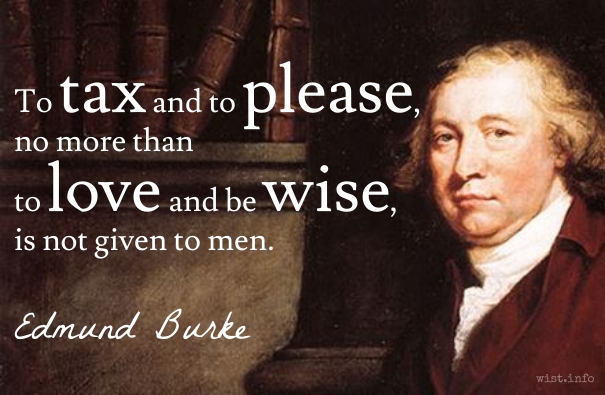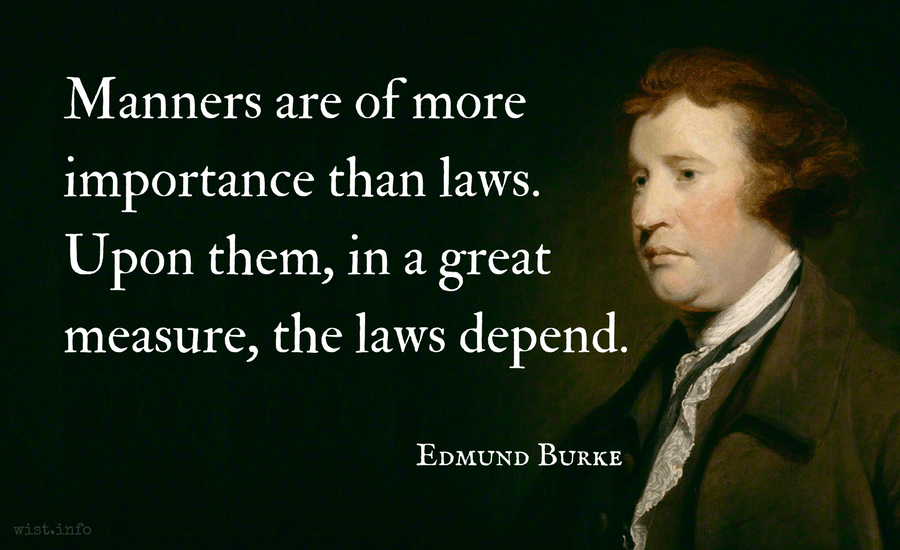Quotations by:
Burke, Edmund
Tyrants seldom want pretexts.
Edmund Burke (1729-1797) Anglo-Irish statesman, orator, philosopher
“Letter to a Member of the National Assembly” (1791)
Full text.
Public calamity is a mighty leveler.
Edmund Burke (1729-1797) Anglo-Irish statesman, orator, philosopher
“On Conciliation With America,” speech, House of Commons (22 Mar 1775)
(Source)
The use of force alone is temporary. It may subdue for a moment; but it does not remove the necessity of subduing again; and a nation is not governed which is perpetually to be conquered.
Justice is itself the great standing policy of civil society; and any eminent departure from it, under any circumstances, lies under the suspicion of being no policy at all.
Edmund Burke (1729-1797) Anglo-Irish statesman, orator, philosopher
“Reflections on the Revolution in France” (1790)
(Source)
It is an advantage to all narrow wisdom and narrow morals that their maxims have a plausible air; and, on a cursory view, appear equal to first principles. They are light and portable. They are as current as copper coin; and about as valuable. They serve equally the first capacities and the lowest; and they are, at least, as useful to the worst men as to the best. Of this stamp is the cant of not man, but measures; a sort of charm by which many people get loose from every honourable engagement.
When bad men combine, the good must associate; else they will fall, one by one, an unpitied sacrifice in a contemptible struggle.
Edmund Burke (1729-1797) Anglo-Irish statesman, orator, philosopher
“Thoughts on the Cause of the Present Discontents” (23 Apr 1770)
May be the origin of the attributed (but never located in Burke's works): "The only thing necessary for the triumph of evil is for good men to do nothing." See also Mill.
To complain of the age we live in, to murmur at the present possessors of power, to lament for the past, to conceive extravagant hopes of the future, are the common dispositions of the greatest part of mankind.
I am not one of those who think that the people are never in the wrong. They have been so, frequently and outrageously, both in other countries and in this. But I do say, that in all disputes between them and their rulers, the presumption is at least upon a par in favour of the people.
Observe that part of a beautiful woman where she is perhaps the most beautiful, about the neck and breasts; the smoothness; the softness; the easy and insensible swell; the variety of the surface, which is never for the smallest space the same; the deceitful maze, through which the unsteady eye slides giddily, without knowing where to fix, or whither it is carried. Is not this a demonstration of that change of surface continual and yet hardly perceptible at any point which forms one of the great constituents of beauty?
Edmund Burke (1729-1797) Anglo-Irish statesman, orator, philosopher
A Philosophical Inquiry into the Origin of Our Ideas of the Sublime and the Beautiful, 3.15 (1756)
(Source)
We are indebted for all our Miseries to our Distrust of that Guide which Providence thought sufficient for our Condition, our own Natural Reason, which rejecting both in Human and Divine things, we have given our Necks to the Yoke of Political and Theological Slavery.
The whole Business of the Poor is to administer to the Idleness, Folly, and Luxury of the Rich; and that of the Rich, in return, to find the best Methods of confirming the Slavery and increasing the Burdens of the Poor.
Manners are of more importance than laws. Upon them, in a great measure, the laws depend. The law touches us but here and there, and now and then. Manners are what vex or soothe, corrupt or purify, exalt or debase, barbarize or refine us, but a constant, steady, uniform, insensible operation, like that of the air we breathe in. They give their whole form and color to our lives. According to their quality, they aid morals, they supply them, or they totally destroy them.
Edmund Burke (1729-1797) Anglo-Irish statesman, orator, philosopher
Letters on a Regicide Peace, Letter 1 (1796)
(Source)
A state without the means of some change is without the means of its conservation.
Edmund Burke (1729-1797) Anglo-Irish statesman, orator, philosopher
Reflections on the Revolution in France (1790)
(Source)
He that wrestles with us strengthens our nerves and sharpens our skill. Our antagonist is our helper.
Edmund Burke (1729-1797) Anglo-Irish statesman, orator, philosopher
Reflections on the Revolution in France (1790)
(Source)
Eloquence may exist without a proportionable degree of wisdom.
Edmund Burke (1729-1797) Anglo-Irish statesman, orator, philosopher
Reflections on the Revolution in France (1790)
Full text.
The arguments of tyranny are as contemptible as its force is dreadful.
Edmund Burke (1729-1797) Anglo-Irish statesman, orator, philosopher
Reflections on the Revolution in France (1790)
(Source)
People crushed by law have no hopes but from power. If laws are their enemies, they will be enemies to laws; and those, who have much to hope and nothing to lose, will always be dangerous, more or less.
I did not obey your instructions. No. I conformed to the instructions of truth and Nature, and maintained your interest, against your opinions, with a constancy that became me. A representative worthy of you ought to be a person of stability. I am to look, indeed, to your opinions, — but to such opinions as you and I must have five years hence. I was not to look to the flash of the day. I knew that you chose me, in my place, along with others, to be a pillar of the state, and not a weathercock on the top of the edifice, exalted for my levity and versatility, and of no use but to indicate the shiftings of every fashionable gale.
They defend their errors as if they were defending their inheritance.
Edmund Burke (1729-1797) Anglo-Irish statesman, orator, philosopher
Speech on Economical Reform, House of Commons (11 Feb 1780)
(Source)
Certainly, Gentlemen, it ought to be the happiness and glory of a representative to live in the strictest union, the closest correspondence, and the most unreserved communication with his constituents. Their wishes ought to have great weight with him; their opinions high respect; their business unremitted attention. It is his duty to sacrifice his repose, his pleasure, his satisfactions, to theirs, — and above all, ever, and in all cases, to prefer their interest to his own.
But his unbiased opinion, his mature judgment, his enlightened conscience, he ought not to sacrifice to you, to any man, or to any set of men living. These he does not derive from your pleasure, — no, nor from the law and the Constitution. They are a trust from Providence, for the abuse of which he is deeply answerable. Your representative owes you, not his industry only, but his judgment; and he betrays, instead of serving you, if he sacrifices it to your opinion.




